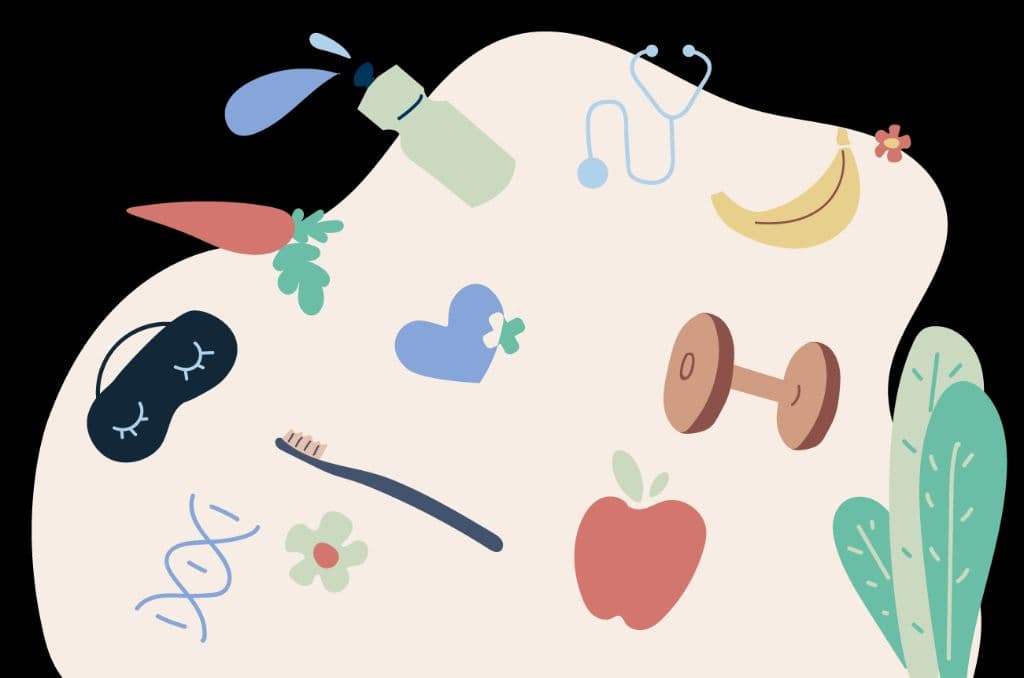Our mind and body are connected together. Imbalance in one, may affect the other. Brain fog is one such interconnected manifestation. It can leave you feeling exhausted and underperforming mentally, emotionally, socially and professionally.
Brain fog is a state of not feeling present mentally. It's not a medical condition by itself. It simply indicates that your mind is finding it difficult to perform its usual activities.
Some ways you may experience brain fog are
- Lack of concentration
- You are unable to focus
- You're finding it hard to remember stuff you usually do
- You feel zoned out
Some other symptoms could look like -
- Repeated unexplained headaches
- Feeling anxious
- Feeling confused
- Low energy levels
- Finding it hard to fall or stay asleep
- Feeling detached from your loved ones or an inability to connect with others emotionally
What are some of the causes of brain fog ?
Stress
- Long standing stress affects blood pressure, reduces our capacity to fight off infections and leaves us feeling fatigued.
- Stress can also trigger infections. It's one of the most common causes of brain fog.
Vitamin and mineral deficiencies
- Some vitamins affect the oxygen carrying capacity of our blood and cause anaemia. If our brain does not receive adequate oxygen, it can lead to a variety of symptoms that include brain fog.
- Vitamin B 12 and the iron are two such essential components of our diets that prevent anaemia. Lack of those can impact proper functioning of your brain.
- Vitamin D is one more vitamin that can affect focus and concentration. Lack of sunlight can lower your vitamin D levels and your energy too.
- Magnesium and potassium imbalances are also likely causes of brain fog. Magnesium deficiency is associated with chronic fatigue syndrome. Those with lower levels of potassium also experience constipation, cramps and low energy.
- The simplest way to treat them is to take a supplement and include appropriate foods in your diet.
Lack of sleep
- An interesting study done in UCLA noted that the neurons a.k.a brain cells of persons who slept less fired more slowly and underperformed.
- Sleep deprivation affects cognition, memory, attention spans, moods, our reaction time and decision making ability. Lack thereof causes brain fog.
- Poor sleep affects our REM sleep structure and also impairs hormone production and detoxification in the body.
Insulin resistance and PCOS
- Our moods in our body are closely related to our blood sugar levels. Any highs and dips in our sugar levels proportionally affect our moods and brain's functioning.
- PCOS persons also deal with a vitamin D deficiency that can potentiate brain fog.
- Poor sleep is an additional factor causing disturbed mental health in PCOS persons.
Thyroid imbalances
- Thyroid hormone controls the metabolism in our body. Low amounts of thyroid hormone affect each and every metabolic process in our body.
- Thyroid hormone-related brain fog can feel like short or long term memory loss, difficulty to concentrate and increased forgetfulness alongside increased weight, feeling of lethargy, constipation, bloating and irregular periods.
Migraines
- People with migraines have brain cells that are particularly sensitive to changes in temperature or triggers such as cheese, chocolate etc.
- When a migraine episode occurs, you could experience brain fog in any one of its four stages. It’s temporary and your cognitive capability improves once the attack has passed.
- In the prodromal phase or before the headache, you may find yourself experiencing brain fog or emotional changes.
- In those that experience an aura, or a sign that your attack is about to happen such as flashing lights or dots, you may end up feeling confused, weak or giddy. Aura usually lasts for an hour or so before you get your throbbing headache.
- During an active migraine attack the feeling of intense pain leads to you experiencing a brain fog. Patients have a reduced ability to think clearly, read or learn.
- After a headache in the “postdrome phase “ a lot of individuals experience brain fog as a result of extreme exhaustion or sleep deprivation. They often report feeling hungover.
Existing mental health conditions
- Mental health concerns such as depression, anxiety, bipolar disorder, PTSD and schizophrenia affect your mood, behavior and emotions.
- They impair your brain’s ability to think clearly. If mental health conditions are undiagnosed for a long time, they may affect your brain function too.
- Brain fog, in turn, can worsen these conditions as well
1. Autoimmune diseases
- Chronic conditions such as lupus and Sjogren’s syndrome are also associated with brain fog. The inflammation that comes with long term diseases also impairs the ability of your brain cells to perform their best.
- The good news is that this brain fog does not get worse progressively.
Stress, sleep deprivation and medications such as steroids or immunosuppression in autoimmune diseases can worsen brain fog.
2. Medication
- Any medication that affects hormone levels, blood sugars, blood pressure or attention levels can cause brain fog, thus, antihypertensives, birth control pills, diabetes medication, and sleep aids all fall under this category.
- Cancer patients also experience brain fog that is called “chemo fog “.
- Discuss your medication with your doctor if it's causing these symptoms.
3. Dehydration
- Prolonged dehydration in individuals with kidney disease or other chronic conditions or those on high blood pressure medication can reduce the levels of water in brain cells.
- Low water levels in them can cause a buildup of toxic proteins in brain cells and result in brain fog.
- This is a larger issue in older individuals. A study done on around 1065 individuals over 65 years found that individuals with dehydration had a higher risk of cognitive decline.
Lower levels of muscle leads to lower levels of stored water in the body and increased risk of dehydration.
What are some things you can do to avoid brain fog ?
- If your condition is untreatable / unavoidable such as using certain medications or autoimmune illness or Alzheimer's disease, the following things help
- Prioritize : Dividing tasks into “ must-do’s” v.s “good to do’s” helps in getting your most essential activities completed.
- Jot everything down : Minimize the load on your memory. If need be, make notes during conversations.
- Find a time of the day when you're most productive or focused and use it to get important things done.
- Start journaling as an effective way to record your thoughts.
- Keep your brain active with puzzle or brain stimulation activities.
- Discuss your condition openly with loved ones, employers and caregivers so that other aspects of your care such as medications or doctor visits are not missed.
- Involve mental health professionals in your care plan.
- If you’re condition is treatable -
- Make sure you’re getting 6 -8 hours of sleep in the day.
- Actively work on managing your stress and get professional mental health help if necessary. Engage in de-stressing activities like yoga, meditation and mindfulness in your day. Find time in your day to fill it with activities you enjoy
- If you are experiencing any symptoms of thyroid disease, get your thyroid hormone levels checked and start medication.
- For those with PCOS and insulin resistance, the goal is to keep your blood sugars steady throughout the day.
- Try having a fixed schedule around meal timings.
- Consume plenty of medium to low G.I foods.
- Have plenty of antioxidant foods in your diet
- At least once a year get your vitamin levels checked and correct vitamin deficiencies with supplements or good foods. For eg, anaemia can be corrected with iron and B12 supplements or leafy greens and healthy meats in your diet.
- If you struggle with migraines, try and identify your triggers and work to avoid those triggers in your daily routine. Some of the most common triggers are sleep deprivation, skipping meals, cheese, chocolate, loud music, weather changes and red wine, in no particular order. Take medicine as soon as you feel like you’re getting a migraine.
- Physical activity in some or the other form will improve your mood and any brain fog as well.
- Ensure that you are consuming adequate amounts of water in the day. Track your water intake.
Bottom line
While brain fog may feel frustrating and it may feel like you’re stuck in a rut, not all is lost. It’s very easy to manage most causes of brain fog. Talk to your doctor about your symptoms and sometimes a test and a supplement is all you may need to feel better. Taking good care of your mind and body is the first step to recovery !
Disclaimer - This information is provided for educational purposes and should not be construed as medical advice. Please consult with your healthcare practitioners before undertaking any changes in your diet or adding supplements.
ProactiveForHer is a digital clinic for women, offering accessible, personalized, and confidential health-care solutions. We offer products and services for out-patient health concerns of Indian women, across their lifetime - from puberty to pregnancy to menopause. To know more on the sexual and reproductive health of women, visit https://www.proactiveforher.com/

